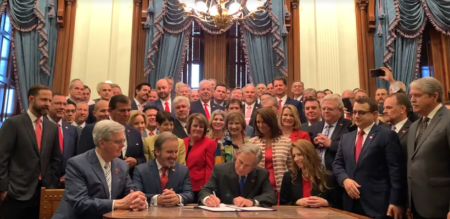Texas Gov. Greg Abbott signs fetal heartbeat bill banning abortion as early as 6 weeks

Texas has become the latest and largest state to enact a “heartbeat bill” that would ban abortion after a fetal heartbeat can be detected, which is usually at around six weeks gestation.
“Our Creator endowed us with the right to life,” Texas’ Republican Gov. Greg Abbott proclaimed as he signed Senate Bill 8 into law Wednesday. “Yet, millions of children lose their right to life every year because of abortion. In Texas, we want to save those lives.”
The heartbeat bill is now LAW in the Lone Star State.
— Greg Abbott (@GregAbbott_TX) May 19, 2021
This bill ensures the life of every unborn child with a heartbeat will be saved from the ravages of abortion.
Thank you @SenBryanHughes, @ShelbySlawson, & #txlege for fighting for the lives of the unborn in Texas. pic.twitter.com/aolhUKM9tv
Slated to go into effect on Sept. 1, Senate Bill 8 states that “a physician may not knowingly perform or induce an abortion on a pregnant woman if the physician detected a fetal heartbeat for the unborn child.” Physicians are also prohibited from performing an abortion if they failed to perform an ultrasound to detect a fetal heartbeat.
The bill also allows individuals to take civil action against an abortionist who “performs or induces an abortion” and any person who “knowingly engages in conduct that aids or abets the performance or inducement of an abortion, including paying for or reimbursing the costs of abortion through insurance or otherwise.”
At the signing ceremony, Abbott praised the Texas Legislature for crafting a bipartisan bill “that ensures that the life of every unborn child who has a heartbeat will be saved from the ravages of abortion.” The governor also thanked the Legislature, singling out the bill’s authors, Sen. Bryan Hughes and Rep. Shelby Slawson. In addition, he expressed gratitude for the pro-life groups who “worked tirelessly during the course of the session to make sure this bill got passed,” thanking them for “everything they do to cultivate a culture of life in Texas.”
The crowd gathered around Abbott erupted into cheers and applause after he signed the bill. After he declared that “the Texas heartbeat bill is now law in the Lone Star State,” more cheers and applause broke out.
Senate Bill 8 passed the Texas House of Representatives on May 6 by a vote of 83–64 and the Texas Senate approved the measure, with House amendments, on May 13 by a vote of 18–13. In both chambers, one Democrat broke from his party to support the legislation, which no Republican opposed.
Pro-life groups quickly praised Abbott for signing Senate Bill 8, with Texas Right to Life predicting that the measure will “save thousands of lives,” characterizing it as “a vital step in the road to abolishing all abortions in Texas.” While praising the legislation as a “landmark victory,” the pro-life advocacy group urged the state Legislature to embrace additional pro-life measures before the legislative session concludes.
Meanwhile, pro-abortion groups slammed the measure and vowed to fight it. Alexis McGill Johnson, the president of Planned Parenthood, the largest abortion provider in the U.S., described Senate Bill 8 as “cruel and extreme.”
Johnson expressed particular concern that the bill includes “a dangerous provision that allows ANYONE from any state to sue an abortion provider and others who help someone get care.” She cited the law as proof that “access to abortion has never been more at risk,” promising that “we’re going to fight back like hell.”
This is cruel and extreme. And they've included a dangerous provision that allows ANYONE from any state to sue an abortion provider and others who help someone get care?? Absolutely not.
— Alexis McGill Johnson (@alexismcgill) May 19, 2021
Access to abortion has never been more at risk — and we're going to fight back like hell. https://t.co/BKaw49p0RI
Heartbeat bills have previously faced resistance from the judicial branch in several states, including Mississippi, Georgia and Missouri. Abbott’s signing of Senate Bill 8 comes two days after the U.S. Supreme Court agreed to take up a case involving Mississippi’s 15-week abortion ban. The case has major implications for the pro-life movement as the Roe v. Wade Supreme Court decision that legalized abortion nationwide nears its 50th anniversary.
The passage of Senate Bill 8 comes as Texas House Republicans face criticism for failing to consider a bill that would ban sex changes for children younger than 18 years of age. With less than two weeks to go, the Texas Senate approved a similar measure that still awaits approval from the House. The push to pass such a bill comes as the state’s 87th Legislative Session is scheduled to come to an end in less than two weeks.
Senate Bill 8 is one of several pro-life state laws signed into law so far this year. Late last month, the pro-abortion Guttmacher Institute released a report finding that more than 500 pro-life bills had been filed in the first four months of 2021, with 61 of those bills becoming law.
In addition to the legislative action taking place at the state level, individual communities in Texas have taken steps to protect the right to life. Two dozen Texas cities have declared themselves “sanctuary cities for the unborn,” completely outlawing abortion at the local level. Earlier this month, the city of Lubbock, Texas, became the largest “sanctuary city for the unborn” in the country. The city of more than 200,000 people faced a lawsuit shortly thereafter.
Ryan Foley is a reporter for The Christian Post. He can be reached at: [email protected]





















